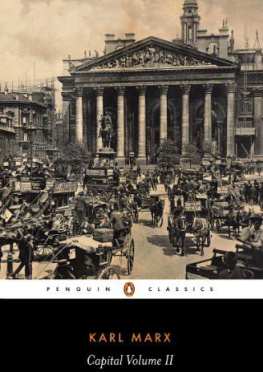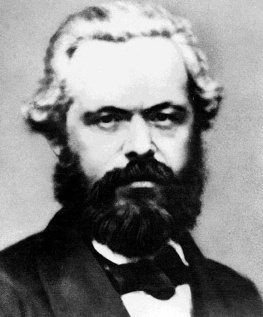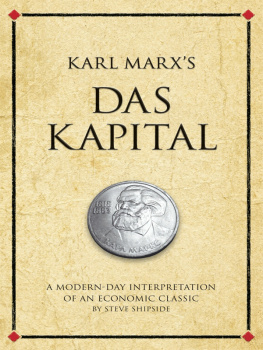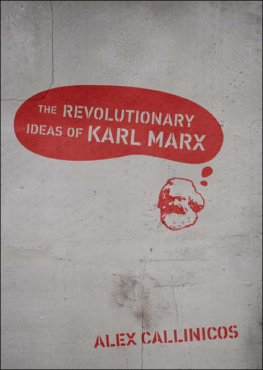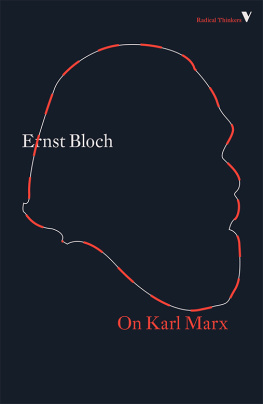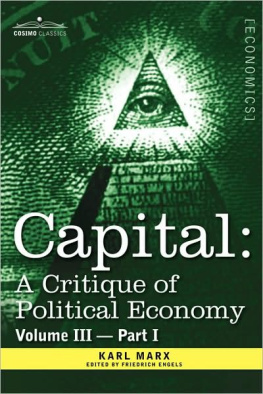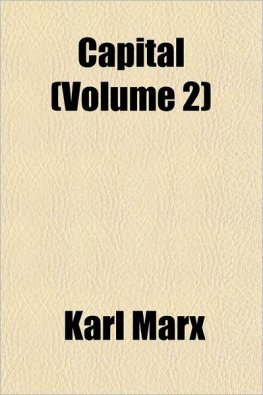Karl Marx - Selected Works of Karl Marx
Here you can read online Karl Marx - Selected Works of Karl Marx full text of the book (entire story) in english for free. Download pdf and epub, get meaning, cover and reviews about this ebook. year: 0100, publisher: Marxists Internet Archive, genre: Religion. Description of the work, (preface) as well as reviews are available. Best literature library LitArk.com created for fans of good reading and offers a wide selection of genres:
Romance novel
Science fiction
Adventure
Detective
Science
History
Home and family
Prose
Art
Politics
Computer
Non-fiction
Religion
Business
Children
Humor
Choose a favorite category and find really read worthwhile books. Enjoy immersion in the world of imagination, feel the emotions of the characters or learn something new for yourself, make an fascinating discovery.
Selected Works of Karl Marx: summary, description and annotation
We offer to read an annotation, description, summary or preface (depends on what the author of the book "Selected Works of Karl Marx" wrote himself). If you haven't found the necessary information about the book — write in the comments, we will try to find it.
Selected Works of Karl Marx — read online for free the complete book (whole text) full work
Below is the text of the book, divided by pages. System saving the place of the last page read, allows you to conveniently read the book "Selected Works of Karl Marx" online for free, without having to search again every time where you left off. Put a bookmark, and you can go to the page where you finished reading at any time.
Font size:
Interval:
Bookmark:
Table of Contents
Hegels Philosophy of Right
(February 1844)
ForGermany, the criticism of religion has been essentially completed, andthe criticism of religion is the prerequisite of all criticism.
The profaneexistence of error is compromised as soon as its heavenly oratio pro aris etfocis has been refuted. Man, who has found only the reflection ofhimself in the fantastic reality of heaven, where he sought a superman, will nolonger feel disposed to find the mere appearance of himself, thenon-man, where he seeks and must seek his true reality.
Thefoundation of irreligious criticism is: Man makes religion, religiondoes not make man. Religion is, indeed, the self-consciousnessand self-esteem of man who has either not yet won through to himself, or hasalready lost himself again. But man is no abstract being squattingoutside the world. Man is the world of man state, society. Thisstate and this society produce religion, which is an inverted consciousnessof the world, because they are an inverted world. Religion is thegeneral theory of this world, its encyclopaedic compendium, its logic inpopular form, its spiritual point dhonneur, its enthusiasm, its moralsanction, its solemn complement, and its universal basis of consolation andjustification. It is the fantastic realization of the human essencesince the human essence has not acquired any true reality. The struggleagainst religion is, therefore, indirectly the struggle against that worldwhose spiritual aroma is religion.
Religioussuffering is, at one and the same time, the expression of real sufferingand a protest against real suffering. Religion is the sigh of theoppressed creature, the heart of a heartless world, and the soul of soullessconditions. It is the opium of the people.
Theabolition of religion as the illusory happiness of the people is thedemand for their real happiness. To call on them to give up theirillusions about their condition is to call on them to give up a conditionthat requires illusions. The criticism of religion is, therefore, inembryo, the criticism of that vale of tears of which religion is the halo.
Criticismhas plucked the imaginary flowers on the chain not in order that man shallcontinue to bear that chain without fantasy or consolation, but so that heshall throw off the chain and pluck the living flower. The criticism ofreligion disillusions man, so that he will think, act, and fashion his realitylike a man who has discarded his illusions and regained his senses, so that hewill move around himself as his own true Sun. Religion is only the illusory Sunwhich revolves around man as long as he does not revolve around himself.
Itis, therefore, the task of history, once the other-world of truthhas vanished, to establish the truth of this world. It is the immediate taskof philosophy, which is in the service of history, to unmaskself-estrangement in its unholy forms once the holy form of humanself-estrangement has been unmasked. Thus, the criticism of Heaven turns intothe criticism of Earth, the criticism of religion into the criticismof law, and the criticism of theology into the criticism ofpolitics.
Thefollowing exposition a contribution to this undertaking concerns itself notdirectly with the original but with a copy, with the German philosophyof the state and of law. The only reason for this is that it is concerned with Germany.
Ifwe were to begin with the German status quo itself, the result even ifwe were to do it in the only appropriate way, i.e., negatively would still bean anachronism. Even the negation of our present political situation isa dusty fact in the historical junk room of modern nations. If I negatepowdered pigtails, I am still left with unpowdered pigtails. If I negate thesituation in Germany in 1843, then according to the French calendar I havebarely reached 1789, much less the vital centre of our present age.
Indeed,German history prides itself on having travelled a road which no other nationin the whole of history has ever travelled before, or ever will again. We haveshared the restorations of modern nations without ever having shared theirrevolutions. We have been restored, firstly, because other nations dared tomake revolutions, and, secondly, because other nations sufferedcounter-revolutions; on the one hand, because our masters were afraid, and, onthe other, because they were not afraid. With our shepherds to the fore, weonly once kept company with freedom, on the day of its internment.
Oneschool of thought that legitimizes the infamy of today with the infamy ofyesterday, a school that stigmatizes every cry of the serf against the knout asmere rebelliousness once the knout has aged a little and acquired a hereditarysignificance and a history, a school to which history shows nothing but its aposteriori, as did the God of Israel to his servant Moses, the historicalschool of law this school would have invented German history were it notitself an invention of that history. A Shylock, but a cringing Shylock, thatswears by its bond, its historical bond, its Christian-Germanic bond, for everypound of flesh cut from the heart of the people.
Good-naturedenthusiasts, Germanomaniacs by extraction and free-thinkers by reflexion, onthe contrary, seek our history of freedom beyond our history in the ancientTeutonic forests. But, what difference is there between the history of ourfreedom and the history of the boars freedom if it can be found only in theforests? Besides, it is common knowledge that the forest echoes back what youshout into it. So peace to the ancient Teutonic forests!
Waron the German state of affairs! By all means! They are below the level ofhistory, they are beneath any criticism, but they are still an object ofcriticism like the criminal who is below the level of humanity but still anobject for the executioner. In the struggle against that state ofaffairs, criticism is no passion of the head, it is the head of passion. It isnot a lancet, it is a weapon. Its object is its enemy, which it wantsnot to refute but to exterminate. For the spirit of that state ofaffairs is refuted. In itself, it is no object worthy of thought, it isan existence which is as despicable as it is despised. Criticism does not needto make things clear to itself as regards this object, for it has alreadysettled accounts with it. It no longer assumes the quality of an end-in-itself,but only of a means. Its essential pathos is indignation, itsessential work is denunciation.
Itis a case of describing the dull reciprocal pressure of all social spheres oneon another, a general inactive ill-humour, a limitedness which recognizesitself as much as it mistakes itself, within the frame of government systemwhich, living on the preservation of all wretchedness, is itself nothing but wretchednessin office.
Whata sight! This infinitely proceeding division of society into the most manifoldraces opposed to one another by petty antipathies, uneasy consciences, andbrutal mediocrity, and which, precisely because of their reciprocal ambiguousand distrustful attitude, are all, without exception although with various formalities,treated by their rulers as conceded existences. And they mustrecognize and acknowledge as a concession of heaven the very fact that they aremastered, ruled, possessed! And, on the other side, are the rulersthemselves, whose greatness is in inverse proportion to their number!
Criticismdealing with this content is criticism in a
Font size:
Interval:
Bookmark:
Similar books «Selected Works of Karl Marx»
Look at similar books to Selected Works of Karl Marx. We have selected literature similar in name and meaning in the hope of providing readers with more options to find new, interesting, not yet read works.
Discussion, reviews of the book Selected Works of Karl Marx and just readers' own opinions. Leave your comments, write what you think about the work, its meaning or the main characters. Specify what exactly you liked and what you didn't like, and why you think so.




